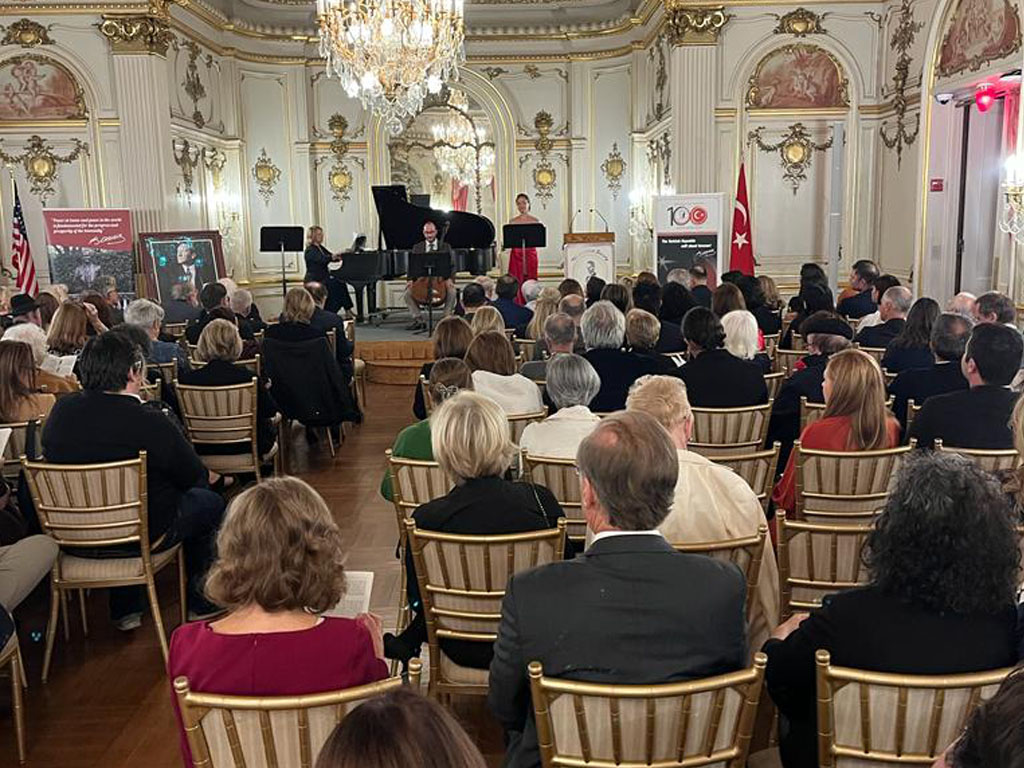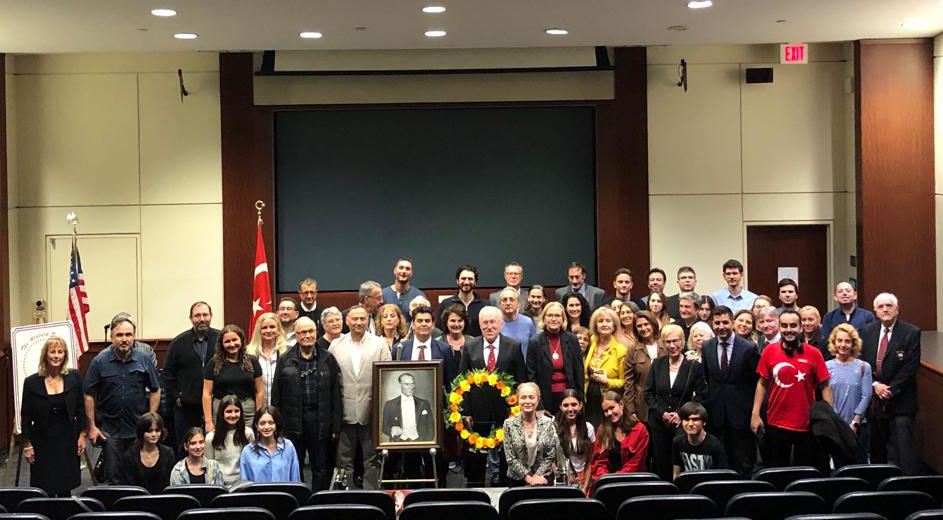War against occupying Colonial Powers
Ilustrated Biography of Atatürk and Chronology of Independence and Reforms War against occupying Colonial powers
May 19, 1919 Hedisembarks in Samsun.
May 20, 1919 Hecables to the Grand Vizier that he “cannot accept protection by a Foreignpower. The greatest source of protection and support for me is in the bosom ofmy nation.”
May 26, 1919 TheOttoman Government decides to request the British mandate.Ataturk first messageto all civilian and military officers of the Empire asking them to fight forfreedom and independence of the country.
June 22, 1919 Heissues Amasya Declaration regarding the need for a national resistance againstthe invasion of foreign powers, and calls for the Sivas Congress of People’sRepresentatives.
June 23, 1919 TheOttoman Government divests him from his official functions.
July 8, 1919 He resignsfrom all functions in the Ottoman service and declares to be “a privateindividual”.
July 30, 1919 UponBritish request the Ottoman Government orders his arrest.
July 23-August 7,1919 Erzurum Congress convenes and declares the National Pact.
August 3, 1919 Ataturk’s message to the American representatives in Istanbul: “Thenational movement’s real and definitive reason is the events that occurred inIzmir, and the threat of Armenian invasion. The objective of Congress ofErzurum is beyond the Unionist and Alliance partisans, it is above all thepolitical movements”.
September 4-11, 1919 SivasCongress convenes and confirms the Erzurum declaration.
September 9, 1919 Ataturk’s letter to the American Congress announcing the decisions of the SivasCongress: “We request that a group of Congressmen is sent to all cornersof the Ottoman Empire to investigate the prevailing conditions and situation inthe Empire with a clear conscience of a nation that has no special interest orrelations. The investigation must be carried out before arbitrary decisions aretaken for a peace treaty on the future of the Ottoman people and lands”.
September 24, 1919 Ataturk’s message to all foreign representatives in Istanbul denouncing theirpropaganda that the national action is aimed at non-Muslims, and requests themnot to exploit the minorities.
September, 1919 Uponthe instigation of the British and the Ottoman Government, armed raids by severaltribes and sheiks start against M. Kemal’s national movement.
October 24, 1919 Agreement between Italy and Russia is signed to partition the Ottoman Empire.
January 4 & 7, 1920 Ataturk’scall for a national protest against French and Armenian atrocities perpetratedin southern provinces, and against the Greek attempt to annex Izmir.
January 28, 1920 Adoption of the National Pact (Misak-i Milli) by the Parliament in Istanbul.The Pact was communicated to foreign parliaments on February 17.
March 16, 1920 Istanbul is occupied by Allied troops. Ataturk sends a protest to all foreignrepresentatives in the country and to their parliaments: “This occupationis an assault more on the principles of the 20th century civilization and onmankind’s conscience than on the Ottomans”.
April 11,1920 TheOttoman Parliament is abolished, and M. Kemal is sentenced to death by areligious decree.
April 23, 1920 TheTurkish Grand National Assembly opens presided by M. Kemal.
May 11, 1920 Ottoman Military Court adopts a death sentence for M. Kemal.
August 10,1920 SevresTreaty, partitioning Turkey between the colonial powers, is signed by theOttoman Government. In all of 1920, Greek forces advance in Thrace and inAnatolia; Armenian armed attacks on eastern cities continue; tribal andreligious reactionary fight against national forces spread to Adapazari,Bandirma, Balikesir, Bolu, Beypazari, Duzce, Hendek, Konya, Kohne, Mudurnu,Siverek, Yenihan, Yozgat, Zile.
October 17,1920 Russia’s request for independent Armenia is rejected by the Turkish GrandNational Assembly.
November 15, 1920 Armenian forces are defeated at Dahne.
December 3, 1920 PeaceTreaty of Gumru is signed with Armenia.
January 20, 1921 Thefirst Constitution of Turkey is adopted by the TGNA. “Turkish state is arepublic. The state’s official language is Turkish. Sovereignty belongsunconditionally and unreservedly to the nation. The Turkish Grand NationalAssembly is the sole and true representative of the people and exercises thenation’s sovereign rights on its behalf. The Assembly exercises legislativepowers. The executive power is exercised by a government designated by thePresident. Judicial power is exercised by an independent judiciary on behalf ofthe people.”
March 1, 1921 TheTurkish Grand National Assembly rejects the Sevres Treaty. The Greek Parliamentdeclares that “No Article of the Sevres Treaty may be changed.”
March 13, 1921 Italysignes the agreement for the withdrawal of their troops from Anatolia.
March 16, 1921 PeaceTreaty of Moscow is signed with Russia.
April 12, 1921 Turkish Grand National Assembly resolution bans the fez. Ataturk protests tothe whole world Greek atrocities committed in Anatolia, and accepts 30.000 goldRubles donated by the Soviets to help the victims of Greek atrocities.
August 5, 1921 He isassigned Commander in Chief bearing all the powers of the National Assembly tolaunch the final offensive against the occupying foreign forces.
September 13, 1921 Hedefeats the Greek army under the personal command of King Constantine atSakarya.
October 13, 1921 Peaceagreement of Kars is signed with Azerbeijan, Georgia, and Armenia.
October 20, 1921 Francesigns the agreement for the withdrawal of their troops from Anatolia.
August 26-September 9, 1922 Finalbattle with Greek forces at Afyon ends with Turkish victory. Greeks evacuateIzmir after setting it to fire.
September 4/5, 1922 Alliedpowers propose truce. Ataturk’s answer that a truce concerning Anatolia is notin question, it may be considered only for Thrace.
September 12/13, 1922 British Fleet Commander enquires from Ataturk whether the Ankara Government isat war with Britain. Ataturk replies “The two governments can establishpolitical relations common to general practices. Ankara is at war with Greece,and Turkish troops are ready to cross over to Thrace.”
September 16, 1922 British Government orders reinforcement of military in the Neutral Zones ofDardanelles and Bosphorus.
September 23, 1922 Turkish troops enter the Neutral Zone in Dardanelles. Allied powers offer truceand convening of a peace conference.
September 25, 1922 Turkish troops enter the Neutral Zone in Bosphorus.
September 26, 1922 Ataturk replies to the British request to withdraw from the Neutral Zone:” We are not aware of a neutral zone agreed between the Ankara governmentand the Allied Powers. Our forces are in pursuit of defeated Greek army”.
September 29, 1922 Ataturkreplies his acceptance of the truce offer. Negotiations start in Mudanya onOctober 3 and Truce is signed on October 11.
October 11, 1922 Occupying forces sign armistice with the Turkish military.
October 20, 1922 British Prime Minister Lloyd George is forced to resign as a result of hisfailure of his Anatolian venture.
November 1, 1922 TheTurkish Grand National Assembly abolishes the Sultanate. Ataturk addresses theParliament stating that sovereignty belongs only to the people represented bythe National Assembly.
November 17, 1922 Sultanleaves Istanbul under British protection.
January 30, 1923 Anagreement is signed between Greece and Turkey for exchange of populations inrespective territories.
July 24, 1923 Thesigning of the Lausanne Treaty between Turkey and Britain, France, Italy,Japan, Greece, Romania and Serbo-Croat-Slovenian Union. The Treaty determinesthe national borders of today’s Turkey, the regime applicable to the Straits,to foreigners in Turkey and to Turkish citizens in the relinquished Ottomanlands, and to the settlement of credits and debts between the Parties. WhileGreece recognized its obligation to compensate for the damages it caused by itsmilitary action in Turkey, considering the financial difficulty that Greece wasin, Turkey renounced its claims. The Treaty also provided for the exchange ofcitizens between Greece and Turkey, and for the rights of the Turkish minorityin Thrace.
October 2, 1923 Occupying forces leave Istanbul.
October 13, 1923 Ankara is declared the capital city.

Mustafa Kemal resigned from military and started to wear civilian clothes. (1919)
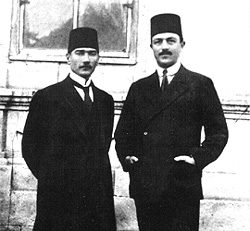
In front of the Sivas Congress building with former Minister of the Navy H.Rauf Orbay (1919)
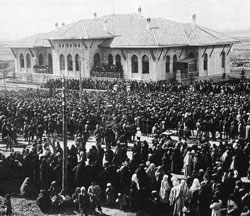
The first Turkish Grand National Assembly Building (1920)
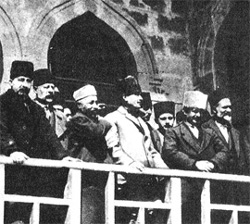
With members of parliament of Turkish Grand National Assembly(1921)

Commander in Chief Mustafa Kemal (1921)
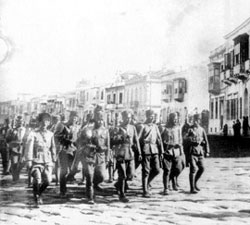
The Turkish Army enters Izmir after great victory. (1922)
LATEST POSTS
Recent Events, Articles & News
The Atatürk World Platform (ADDP) Ordinary General Assembly Meeting was held on 25 November 2023 in London England
The Atatürk World Platform (ADDP) Ordinary General Assembly Meeting was held on 25 November 2023 in London England. The 2nd Ordinary General Assembly Meeting of ADDP, of which the Ataturk Society of America is one of the founding...
100th anniversary celebration of the Turkish Republic
Ataturk Society of America (ASA) held its 100th anniversary celebration of the Turkish Republic at the Cosmos Club in Washington, D.C. on October 11, 2023. The program featured unforgettable musical presentations by guest artists, as...
ASA’s Commemoration of Atatürk Event November 6, 2022
Atatürk Society of America - ASA’s Commemoration of Atatürk event was held in Washington, D.C. on Sunday, November 6th., at the George Washington University (GWU) with the contribution of the Turkish Student Union. The ceremony was...
Aysegul Durakoglu is elected to serve at the Global NGO Executive Committee (GNEC)of the UN
Ataturk Society of America- ASA’s long time member and supporter, pianist Aysegul Durakoglu was elected to serve as a Director of Global NGO Executive Committee (GNEC) at the United Nations from 2021-2023, for a two-year...



